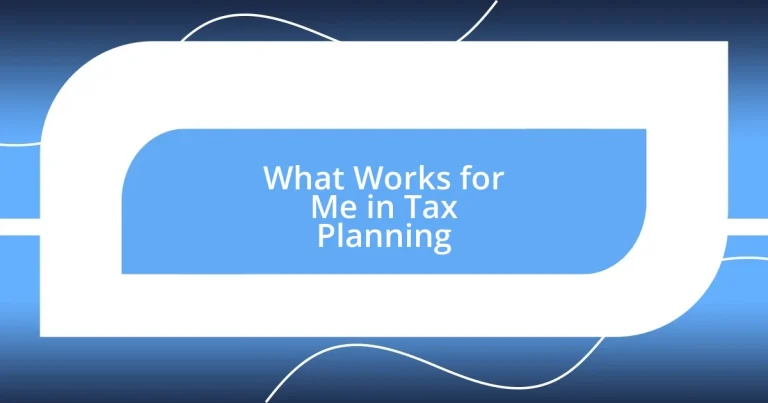Key takeaways:
- Understanding tax deductions and credits can significantly reduce tax liability and improve financial health.
- Implementing year-round tax monitoring and regular reviews of your financial situation allows for proactive planning and informed decision-making.
- Creating a personalized tax strategy aligned with current financial situations and future goals can optimize tax outcomes and lead to substantial savings.
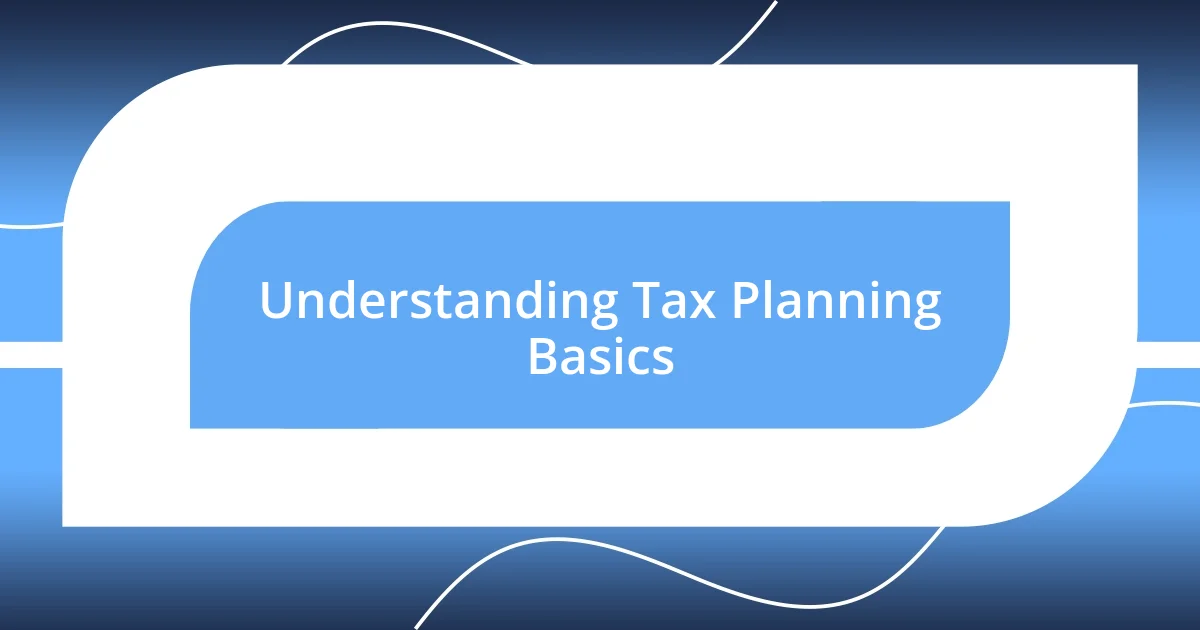
Understanding Tax Planning Basics
Tax planning is one of those topics that might seem daunting at first, but when I dove into it, I found it fascinating. It’s not just about filling out forms; it’s about making informed decisions that can save you money and maximize your financial health. Have you ever thought about how a little foresight in your financial planning can drastically alter your tax outcomes?
As I began my journey in tax planning, I realized the importance of understanding deductions and credits. Simple things like mortgage interest or student loan payments can make a significant difference in your tax bill. I remember my first tax season after buying a home; seeing those deductions was like finding hidden treasure in my financial plan!
Another essential aspect of tax planning is timing. For instance, if you know your income will be higher this year, it might make sense to defer some income or accelerate deductions to ease your tax burden. This kind of strategic thinking can transform how you view your finances. Isn’t it empowering to know you can influence your tax outcome?

Developing a Personalized Tax Strategy
Developing a personalized tax strategy is crucial for anyone eager to make the most of their financial situation. In my experience, taking a close look at individual financial circumstances helps in crafting a strategy that resonates personally. For instance, when I first began evaluating my finances, I noticed that my investment income fluctuated year to year. By mapping out these variations, I was able to strategically time my income recognition, which significantly reduced my tax liability.
When formulating your strategy, consider not just your present situation but also your future goals. I often remind myself that life changes—like starting a family or switching careers—impact tax obligations. For example, the year I started freelancing, I discovered the value of setting aside funds for estimated taxes. It transformed my approach to budgeting and gave me peace of mind, knowing I wouldn’t face any unexpected tax bills come April.
As you personalize your tax strategy, it’s essential to stay informed about relevant tax law changes and potential deductions. I can’t stress enough the value of regularly consulting with a financial advisor. In my case, working closely with an advisor made me aware of tax credits I hadn’t considered, such as those for energy-efficient home improvements. This kind of proactive planning can yield significant savings over time.
| Strategy | Description |
|---|---|
| Deductions & Credits | Identify all possible deductions and credits relevant to your situation. |
| Income Timing | Adjust the timing of income recognition to optimize tax liability. |
| Consulting Advisors | Work with financial advisors to uncover potential tax-saving opportunities. |
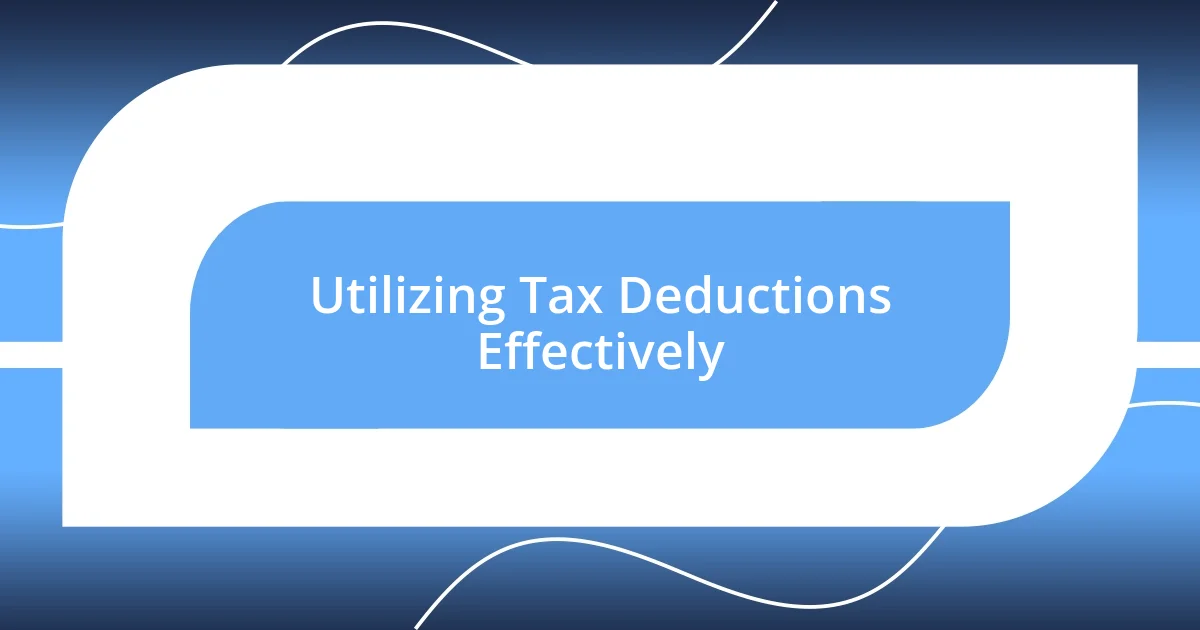
Utilizing Tax Deductions Effectively
Utilizing deductions effectively can be a game changer in tax planning. I still remember the relief I felt when I discovered that I could deduct my home office expenses while working from home. It was like a light bulb moment—I realized that even the small things, like my internet bill and office supplies, counted. This knowledge motivated me to track my expenses more diligently, which ultimately led to substantial savings. It’s fascinating how awareness can transform your financial landscape.
To make the most of tax deductions, consider the following strategies:
- Keep Thorough Records: Maintaining detailed records of all deductible expenses helps to ensure nothing is overlooked.
- Stay Updated: Tax laws change frequently, so regularly updating yourself on potential new deductions is vital.
- Use financial software: Tools that categorize expenses can simplify tracking and identifying your deductions.
- Consult with professionals: Engaging with tax professionals can uncover deductions you may not be aware of, maximizing your savings.
Managing my tax deductions has fundamentally altered my approach to budgeting. I find myself thinking differently about the things I spend money on, seeing them not just as expenses but as opportunities for deduction. By being proactive, it has changed my mindset from reactive tax filer to an informed tax strategist. It’s a rewarding feeling, knowing that I have control over my financial well-being!
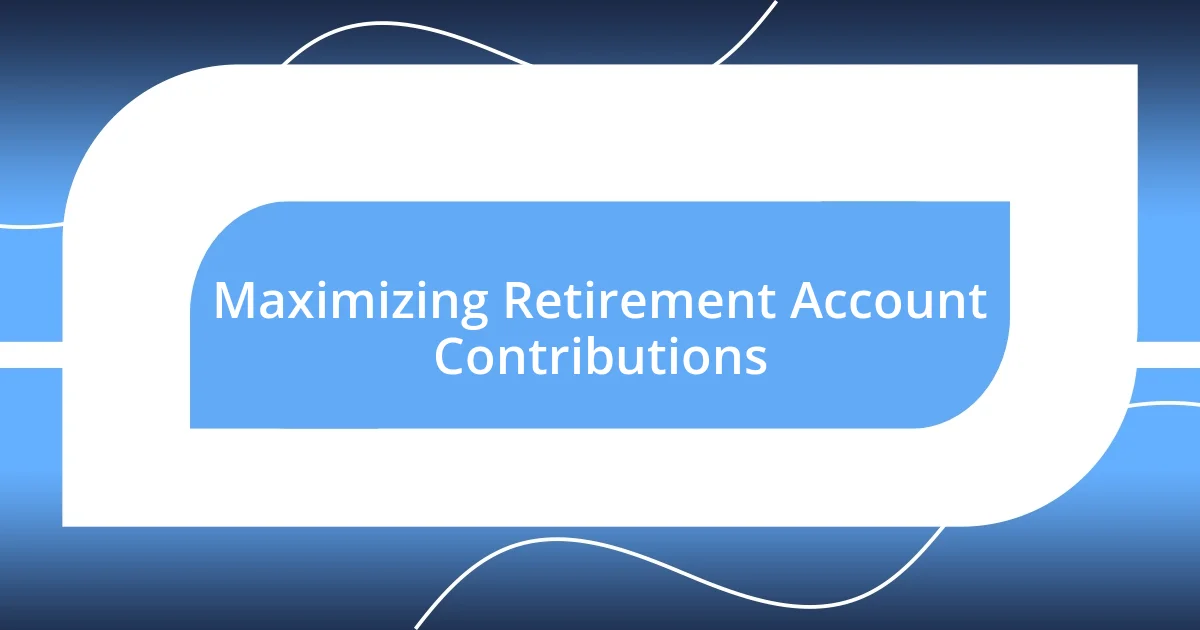
Maximizing Retirement Account Contributions
Maximizing contributions to retirement accounts is one of the smartest financial moves I’ve made. I vividly recall the first time I fully funded my 401(k); it felt like I was solidifying my future. Making contributions not only reduces my taxable income, but it also helps me invest in my long-term goals. Every paycheck feels less daunting knowing I’m prioritizing my retirement savings.
One technique I’ve found particularly effective is rolling over an old employer’s retirement account into a new one when I switch jobs. It’s tempting to cash out, but that moves money into taxable income territory—something I’ve learned to avoid. By keeping my money in a retirement account, it’s growing tax-deferred, which can significantly benefit my future financial security. Have you considered the impact of compounding growth over time on your retirement savings? Trust me; the numbers can be eye-opening.
I also like to take full advantage of catch-up contributions in my older years. It’s empowering to realize that even if I didn’t start saving early, I can still maximize my contributions as I approach retirement age. The year I turned 50, I made it a point to increase my contributions—letting my older self benefit from the years I missed. It’s an exhilarating feeling to know that I’m doing everything possible to build a comfortable retirement!

Exploring Tax Credit Opportunities
Exploring tax credits has opened up a range of savings opportunities for me over the years. When I first learned about the Earned Income Tax Credit (EITC), it was almost like finding a hidden treasure. This credit can significantly reduce your tax bill and, in some cases, lead to a refund. I remember feeling empowered after realizing that working part-time and earning a little bit more could qualify me for this credit—what a pleasant surprise that was!
Another intriguing aspect of tax credits is the Child Tax Credit. As a parent, I recall the relief and joy I experienced the first time I claimed it. It felt like a well-deserved bonus that helped ease the burden of raising kids. This credit allows me to offset some of the costs associated with parenting, which is especially useful as those back-to-school expenses start piling up. Have you tapped into how these credits can impact your overall tax strategy? For me, it has been a crucial element in planning my finances effectively.
I also discovered the importance of energy-efficient home renovations through credits available for such improvements. when my family decided to upgrade our HVAC system, we were shocked at how much we could save in taxes afterward. I think about the perfect synergy of enhancing our comfort at home while also benefiting financially. This kind of strategic planning is what keeps me engaged and excited about tax season—there’s always potential for optimization!
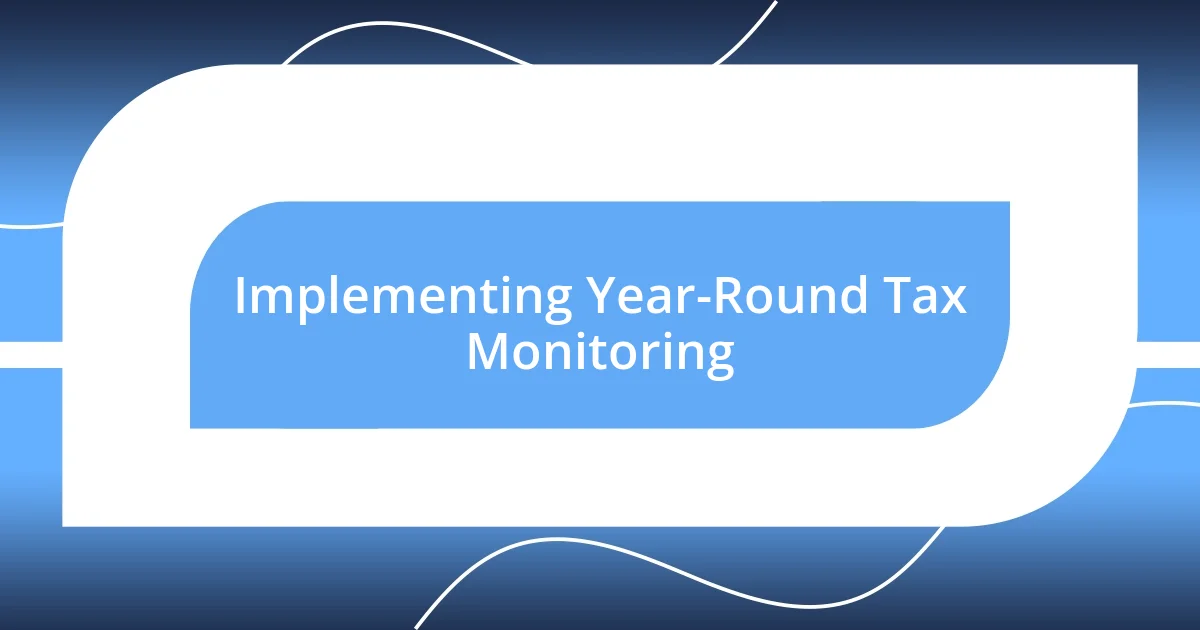
Implementing Year-Round Tax Monitoring
Implementing year-round tax monitoring has been a game changer for me. I remember when I used to wait until tax season to evaluate my situation—I’d often feel overwhelmed. Now, I schedule quarterly check-ins to review my income and expenses, ensuring I’m on track with my tax strategy. This proactive approach diminishes the anxiety that comes with the deadline, allowing for smoother adjustments along the way.
Taking the time to monitor my tax situation regularly has revealed opportunities I previously overlooked. For instance, in the past, I would sometimes forget to record deductible expenses that could end up giving me a more favorable tax outcome. By keeping a digital folder where I immediately store receipts and notes throughout the year, I now have everything organized when it’s time to file. It’s incredible how this simple habit saves me from scrambling at the last minute and, quite frankly, saves me money.
I also find it enlightening to stay updated on any tax law changes throughout the year. I remember being caught off guard about the Tax Cuts and Jobs Act; a friend who stayed informed navigated the changes much more smoothly than I did. By subscribing to a reliable financial news source, I can adapt my strategy throughout the year. Are you keeping tabs on tax legislation? It’s a thoughtful investment in your financial literacy and can significantly influence how I approach my yearly planning.
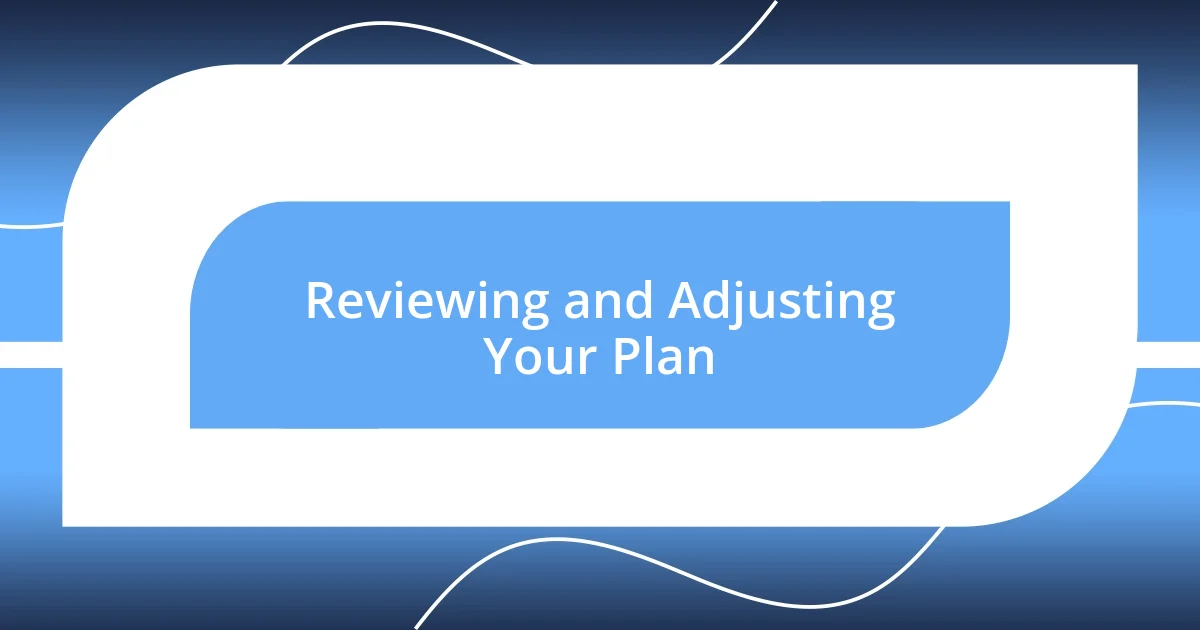
Reviewing and Adjusting Your Plan
I find that regularly reviewing and adjusting my tax plan is essential for staying on top of my financial goals. At the end of every calendar year, I take a hard look at my income and deductions, which has often left me surprised by how much I’ve changed financially. For instance, last year, I wasn’t expecting a promotion that bumped my income significantly. Realizing this earlier in the year helped me reallocate some funds into tax-advantaged accounts—a small adjustment that led to notable savings.
It’s also important for me to connect emotionally with my financial decisions. I remember a summer when I finally decided to diversify my investments after noticing how stagnant my returns were. By re-evaluating my portfolio and making adjustments based on market trends and potential tax implications, I felt more confident and empowered. This not only improved my financial standing but also brought me peace of mind knowing I was not just reacting but actively strategizing.
Sometimes, I even jot down my thoughts about what worked and what didn’t in my tax strategy throughout the year. A key question I reflect on is: how did the changes I implemented impact my overall financial wellbeing? This journaling practice has helped me identify patterns and adjust future planning. For example, after realizing that I consistently overspend in certain categories, I shifted my approach, freeing up more funds for tax-deferred contributions. Engagement in this review process makes me feel more in control of my future, which is an invaluable feeling.












